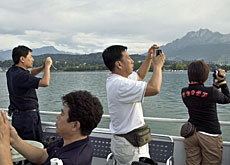watches and alps hook chinese

Chinese tourists adore Switzerland for its mountains, its fresh air and its typical "Swiss Made" products, but tailoring specific offers for them is not easy.
Tourist operators in China say their customers want detailed information on Switzerland’s hotels, shopping possibilities and food for them and their compatriots.
The profile of the typical Chinese considering a trip to Europe today is someone young living in a big city. Many work either for an international organisation or for the Chinese government, while others are rich businessmen.
Most of them buy a package holiday for up to two weeks or three countries, preferably France, Italy and Switzerland. Nearly all of them come in groups, partly because it is the Chinese way of travelling and also because it’s easier to get a visa.
Faced with the task of selling the very essence of “Swiss Made”, the country in the heart of Europe, Wenjia Zhang says getting the local Chinese media interested is the key to getting them to spread the
message about Switzerland.
According to Zhang, who is the director of the Switzerland Tourism in Beijing, around 60 journalists are invited each year to sample Swiss delights.
“Their reports make the people dream of a trip to the Swiss mountains. Many Chinese are truly fascinated by the idea of visiting a Swiss Alp,” she adds.
Switzerland included
Equally important for the tourist board is ensuring that Swiss destinations are included in the European holiday packages.
“Close contacts with Chinese tour operators are essential,” said Zhang
who is also in charge of Switzerland Tourism’s offices in Shanghai, Hong Kong and Taipei. She admits that stiff competition from other countries means that the Swiss have to be innovative with their campaigns.
“We have been very active and organised many seminars. But by now everyone here has heard of the Swiss mountains and is aware that Geneva is the seat of more than 200 international organisations.”
Zhang says customers from the Far East like getting detailed and specific information, in particular about food because the Chinese prefer their own style of cooking.
“Tour operators should provide
restaurants and hotels at their European destinations where tourists can get Chinese food,” she told swissinfo.
China was a closed world up to the early 1990s but it has opened up since. Beijing and Shanghai are cosmopolitan cities and the Chinese who travel overseas know more and more about their holiday destinations.
The days when the tourists were put in a coach for ten days only to see the motorways of a dozen countries are long gone.
Knowledgeable visitors
Most of the tourists know exactly what they want to see, according to Zhang, and they choose their
destinations carefully.
It can be France for its culture and fashion, Italy for history or Switzerland for its clocks and watches. “The clients come from busy cities. Switzerland is like a paradise for them where they can relax and enjoy the fresh air,” she adds.
Zhang who has been with Switzerland Tourism in China for eight years, reckons that the Chinese are not particularly interested in churches or Switzerland’s cultural heritage. These are the highlights of other destinations on their tour.
Switzerland has one major attraction – shopping. Generally, the Chinese tourist who can afford
it wants top quality and is not shy to show off his latest acquisitions – or to make gifts to family and friends – upon his return home.
“Nearly all who have visited Switzerland bought at least a the Chinese tourist who can afford it wants top quality and is not shy to show off his latest acquisitions – or to make gifts to family and friends – upon his return home.
“Nearly all who have visited Switzerland bought at least a watch,” Zhang points out. “It is often a timepiece of the latest collection not available yet in China.”
Watches “made in Switzerland”, bought during a holiday to Switzerland have become a status
symbol of sorts for the wealthy in China.
And perhaps they are becoming a symbol of success for the Swiss tourism industry in one of the world’s fastest developing markets.
swissinfo, Marzio Pescia in Beijing
The number of overnight stays of Chinese tourists in Switzerland doubled over the past five years to 220,000 in 2005.
Switzerland Tourism hopes to increase the number of such overnight stays to 800,000 by 2015.
Chinese tourists spend an average of SFr450 a day in Switzerland – compared with the SFr250 average of European tourists.
An estimated 150 million Chinese have the means to travel abroad.
The Swiss tourist industry recorded 32.9 million overnight stays last year.
Tourism is the fourth most important sector of the Swiss economy with sales of SFr46 billion ($37.8 billion) annually.

In compliance with the JTI standards
More: SWI swissinfo.ch certified by the Journalism Trust Initiative
You can find an overview of ongoing debates with our journalists here . Please join us!
If you want to start a conversation about a topic raised in this article or want to report factual errors, email us at english@swissinfo.ch.